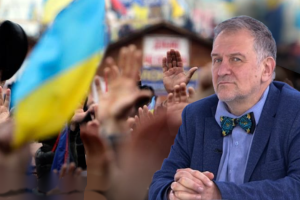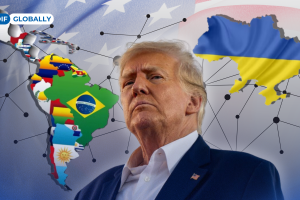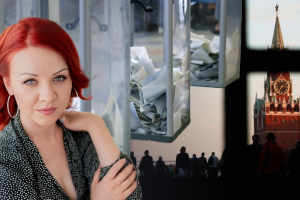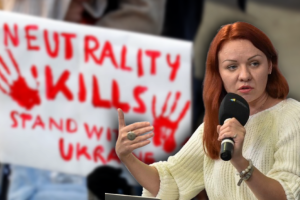
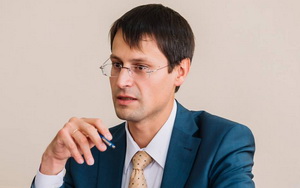
Petro Burkovskiy,
Head of Department National Institute
for Strategic Studies,
Analyst at Ilko Kucheriv Democratic Initiatives Foundation
According to Arnold Toynbee’s view when certain human society, a civilization, faces existential challenge it either finds proper respond and develops or collapses to give way to others. This can be hardly debated but when we are witnessing contemporary dramatic events in post-electoral Ukraine it is hard to come to agreement whether we see brutal end or daring beginning.
In order to understand why overwhelming majority of Ukrainians, who cast their votes in the run-off of presidential elections, preferred unexperienced newcomer to heavyweight political leader and what will be implications for the nearest future of the country we have to look at political environment before elections: trends of the public opinion, failures of political class after EuroMaidan and post-electoral challenges.
Therefore, this analytical report is focused on:
• analysis of public opinion trends before elections and during campaign
• policy making process ,specifically ways and means of major political players.
• issues new president faces in coming months
This brief report is founded on results of the opinion poll conducted by Ilko Kucheriv Democratic Initiatives Foundation in cooperation with Razumkov Center and Kyiv International Institute of Sociology in May, August and December (in Ukrainian) last year. All raw data can be found and checked out on our DIF web page.
1. Social context of pre-election situation in Ukraine
Let me begin with the argument that social fatigue, multiplied by distrust toward establishment and power institutions resulted in outstanding popularity of marginal players. Active civil society also bears responsibility for such outcome.
Social fatigue I define as combination of citizens’ frustration about deterioration of personal wellbeing and anxiety about government’s capability to change situation.
Opinion polls showed that majority of the people perceive their live situation as precarious and socially vulnerable. Three months before elections 3% said they did not have enough money to buy food, 32% told they cannot afford to buy clothes anytime they want or need, 40% had no trouble with food and clothes but cannot make savings or buy stuff like home appliances (fridge, washing machine etc), 18% could do that but can only dream about buying apartment or car, the rest are just 1%.
It is not surprising that 36% of the people thought that their living conditions are hard while 46% believe living is unbearable. Only absolute minority believed (17%) that live would improve in the nearest future while 52% did not expect such development.
When asked about biggest threats to Ukraine’s existence, people mentioned economic decline and crisis (58%), poverty and wealth gap (42%), national currency depreciation (36%). Russian threat comes fourth (31%), country’s breakdown – fifth (28%).
Majority of Ukrainians perceived the state as key redistributive actor, responsible for high social standards of life. 65% were ready to pay more taxes to get free healthcare, educations and retirement payments. Only 21% objected to such state intervention.
77% Ukrainians believed that majority of them cannot survive without government’s help. Only 13% had opposite opinion.
However, Ukrainians were not as consolidated when it comes to cost of government’s intervention. Only 26% were ready to give in their civil rights and certain freedom in exchange for higher social benefits, whereas 35% believed they can sustain hard times in order to keep their fundamental rights untouched. The biggest share, almost 40%, remained wary about that.
Furthermore, when asked about role of the state 45% said the government must guarantee fair play while they take care of their lives , and 44% thought that government must take care about people’s lives.
Here are some thoughts about possible explanation.
Ukrainians are divided on fundamental issues of relations between state and individual because they see that usual governmental business does not make difference. At the same time in the time of war and economic instability there is no other institution powerful enough to do that kind of business.
People believe that these troubles remain imminent due to slow implementation of reforms (which can mean wrong time, wrong goals and tools, wrong people in charge).
Ukrainians blame bureaucracy and oligarchs (39%) for these failures but hardly see their own contribution: 61% are confident that only “iron hand” can bring development of the country.
At the same time 62% of Ukrainians agree with the statement that country needs new type of leaders. To be qualified as a new leader anyone should have integrity. If you got it nothing else matter if you haven’t got it nothing else matter too. Interestingly, clear action plan, good training and education, professionalism, patriotism even genuine leadership skills are secondary.
The leadership qualities demanded by people are: ability to resist corruption (54%), honesty (46%), and willingness to protect people's interests (45%). In one word or western concept people looked for the man or woman of integrity. Additionally, patriotism and a clear action plan were important (22% of respondents), as well as education, professionalism (16%) and genuine leadership skills (15%).
Last May majority of Ukrainians (62%) thought that country needed new political leaders (27% of citizens had an opposite opinion). Interestingly, the highest demand for new leaders was in the Western regions (78%), the lowest, although still high – in the southern regions (46%). The central and eastern regions were in between, there around 60% of citizens were looking for the new leaders.
Moreover, when asked, 54% of Ukrainians would support approve of the prospect of civic activists running for the Verkhovna Rada. 46% of respondents said they positively viewed possibility of civil activists’ participation in politics, because they believed that activists could make difference and transform national politics.
When in August 2019 we asked why people prefer certain candidate, the most frequent answers were: attractive personality of candidate (whatever it means for 36% of people) and sharing same views and ideas (also 36%). Let me admit these are a little bit different motives if compared to demands to the new leaders.
However, people do not see who among established politicians fits this image of “Iron hand in velvet glove”. In August 2018 the negative balance started from -23% for Hrytsenko and -25% for Zelenskyi to -45% for Tymoshenko and -68% for Poroshenko.
When we asked people who could be regarded as new leader they mentioned singer Sviatoslav Vakarchuk, comedian Volodymyr Zelenskyi and MP Evheniy Muraiev.
Thus the political environment in Ukraine was ripe for players that were able to present themselves as honest and communicate back the most appealing views and ideas to their target audiences.
2. Political players: stakes and mistakes of 2014-2018
Despite strong signal sent to elites during Revolution of Dignity by people that they wouldn’t tolerate politics which denies them participation in decision making, Poroshenko’s team ignored that and paid the price.
As a result political initiative was overtaken by powerful shadow dealers, like Kolomoyskiy, Akhmetov, Liovochkin, Pinchuk and even Poroshenko himself. The ugly truth is that the people who control mass media and often present themselves as philanthropists, market-oriented decent businessmen were doing everything possible to populists because they expect to benefit from their policies after elections.
Again, policies were made on the basis of informal agreements between these dealers who benefited from Yanukovych removal. Most evident examples: Vienna agreement between Poroshenko, Firtash and Klichko about elections, agreement between Yatseniuk and Kolomoyskiy about Privatbank owner immunity, Poroshenko and Akhmetov agreement about division of influence in the energy generation market.
Breakdown of these gentlemen of fortune agreements provoked some major recent clashes between players.
It appeared that last half of his presidency Poroshenko struggled against oligarchs who questioned his power. And it was quite successful if success to be measured by share of power concentrated in his hands. However, it was pyrrhic victory because he was portayed as an oligarch himself who failed to deliver his key promises: bringing end to war and fighting corruption.
Recent revelation of Ihor Kolomoyskiy, key oligarch behind new president, brought oligarchic political logic to spotlight. In his interview to journalists of Bihus.Info, who investigated corruption in defense industry, Kolomoyskiy said that Poroshenko failed to adhere to agreement which regulated nationalization of Privatbank, the largest private bank in Ukraine. According to Kolomoyskiy, Poroshenko tried to 50% of 1+1 TV channel from Surkis brothers, business partners of Kolomoyskiy. But then, president Poroshenko, according to Kolomoyskiy word, decided to take control over channel through Privatbank (bank financed tv channel, so owner of the bank might be able to acquire it using its debts).
The so-called “street politics” or mass mobilization of people to reinforce certain political demand or help oligarchs to achieve their goals was widely used and abused between 2015 and 2019.
Example: after disrupted miners’ unrest iduring spring 2015 Poroshenko and Akhmetov developed a plan to sustain integrity of energy system of Ukraine. That meant increase of electricity prices for energy consuming industry and reduction of subsidies electricity supplies.
As a result Kolomoyskiy and Firtash lost money and backed so-called civilian blockade of Donbas. In 2016 Kolomoyskiy also tried to blackmail Poroshenko by backing protests of the people who lost their money in bankrupt banks.
Since late 2016 till beginning of 2018 Kolomoyskiy supported Mikheil Saakashvili and his forceful barraging through Ukrainian-Polish border broadcasted by Kolomoyskiy’s TV channel.
Last month Andriy Bohdan, Kolomoykiy’s lawyer and key assistant to president-elect Zelenskyi admitted in interview to Ukrainska pravda that comedian agreed to take part in politics in March 2018, less than a month after Saakashvili was removed from the stage.
To sum it up, political class refused to accept the fact that people became more self-confident in their ability to give and take back real power. On the other hand, crisis years, marked by social and economic disruption, returning of corruption practices and cynical policy making made people increasingly sensitive to promises of radical changes brought by “iron hand”.
3. Major post-electoral issues
Moreover, dire economic conditions and necessity to secure Western financial and military support would force president-elect to start his/her term by correcting the mistakes of the current president and government.
National Security
Avoid full-scale war with Russia and reduce possibility of domestic conflict. Little can be done by Zelenskyi unless he starts necessary defence reform and shifts focus from struggle in Donbas to preparations against full scale Russian invasion.
Putting constraints on oligarchs
Parliamentary elections are crucial for that. That is purely Zelenskyi choice how to form his party. He can do this if he controls majority within majority and if he could make coalition with other leaders who can resist oligarchic influence.
However, if he tries to become supreme arbiter holding all veto power (like Kuchma in his second term) or nation’s most powerful oligarch (like Yanukovych attempted) his days in office will be numbered.
Things can develop in the completely wrong direction if he leases the right to form his party mainly to oligarchs. This can result in the Ukrainian version of so called “illiberal democracy” and further deterioration of democratic achievements of Revolution of Dignity.
___________________
This monthly analytical review was prepared by the Ilko Kucheriv Democratic Initiatives Foundation as a part of its ‘National Exit Poll 2019’ project implemented under the USAID/ENGAGE program, which is funded by the United States Agency for International Development (USAID) and implemented by Pact in Ukraine; Delegation of the European Union to Ukraine; International Renaissance Foundation; Embassy of Canada in Ukraine.





